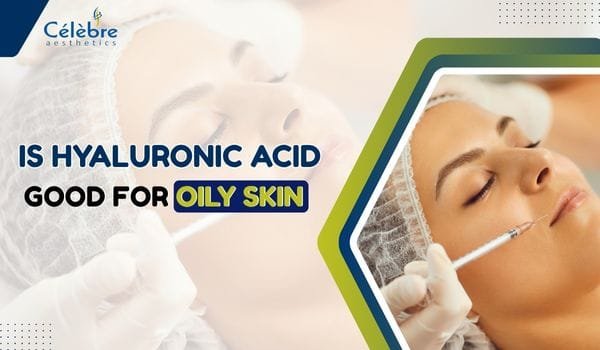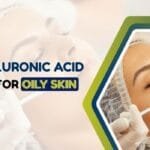Hyaluronic acid (HA) is one of the most buzzed-about ingredients in skincare—and for good reason. Known for its powerful hydrating properties, it’s found in everything from serums to moisturizers. But if you’re dealing with oily skin, you might be wondering: Is hyaluronic acid good for oily skin?
The answer is a resounding yes—and in this blog, we’ll dive into the latest scientific facts, skincare tips, and treatment options that make hyaluronic acid a hero for oily and acne-prone skin types.
What Is Hyaluronic Acid?
Hyaluronic acid is a naturally occurring molecule in your body that acts like a moisture magnet. It helps retain water in your skin cells, keeping your skin plump, hydrated, and youthful-looking. In skincare, HA is used as a topical humectant, which means it draws moisture from the air and deeper layers of your skin to the surface.
Benefits of Hyaluronic Acid for Oily Skin
1. Oil-Free Hydration
Many with oily skin skip moisturizers, fearing they’ll make their skin greasier. But dehydration can actually cause your skin to produce even more oil. HA provides deep hydration without clogging pores or leaving a greasy residue.
2. Balances Sebum Production
Oily skin is often the result of an overactive sebaceous gland. When your skin is dehydrated, it compensates by producing more oil. Hydrating your skin with hyaluronic acid can help bring your skin’s oil production back into balance.
3. Strengthens the Skin Barrier
A healthy skin barrier is essential for managing oiliness and acne. Hyaluronic acid helps reinforce the skin’s natural defense, making it more resilient to external irritants and reducing inflammation.
4. Reduces Acne & Scarring
Dehydration and irritation can worsen acne and post-acne scars. HA soothes the skin, reduces redness, and supports the healing process.
How to Use Hyaluronic Acid for Oily Skin
Step 1: Cleanse
Use a gentle cleanser to remove excess oil and impurities without stripping your skin.
Step 2: Apply Hyaluronic Acid on Damp Skin
HA works best when applied to slightly damp skin, as it helps trap water and keep your skin hydrated longer.
Step 3: Seal with Moisturizer
Follow up with an oil-free moisturizer to lock in hydration.
Step 4: Finish with Sunscreen
Use a non-comedogenic sunscreen during the day to protect your skin without clogging pores.
How to Choose the Right Hyaluronic Acid Product
- Look for Low Molecular Weight HA: It penetrates deeper layers of the skin.
- Non-comedogenic Formulas: Avoid anything with oils or heavy emollients.
- Check for Added Benefits: Products with niacinamide, panthenol, or ceramides can enhance your results.
Can You Use Hyaluronic Acid with Acne Products?
Absolutely. HA pairs well with common acne treatments like benzoyl peroxide, salicylic acid, and retinoids. These treatments can dry out your skin, and HA can help balance and restore hydration without triggering breakouts.
Expert Skin Treatments at Celebre Aesthetics, Surat
For enhanced results, especially if you’re dealing with oily skin, acne, or post-inflammatory hyperpigmentation, Celebre Aesthetics offers advanced skin treatments tailored to your skin’s needs:
- Skin Rejuvenation Treatments – Improve texture, tone, and overall glow using non-invasive procedures.
- Skin Pigmentation Treatment – Target stubborn dark spots and uneven skin tone caused by sun damage or hormonal changes.
- Acne & Acne Scar Treatment – Medical-grade treatments to control acne and visibly reduce acne scars for clearer skin.
Final Verdict: Is Hyaluronic Acid Good for Oily Skin?
Yes, and it may be exactly what your oily or acne-prone skin needs. Instead of skipping hydration, oily skin types should embrace lightweight, water-based products that help balance the skin’s moisture levels—just like hyaluronic acid does.
Whether you’re just starting your skincare journey or seeking advanced cosmetic solutions, incorporating HA can bring visible improvements. And for professional help, Celebre Aesthetics offers customized treatment plans that deliver results.








